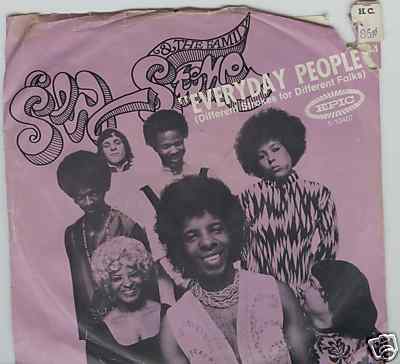- Everyday People (song)
Single infobox |
Name = Everyday People

Artist =Sly & the Family Stone
from Album =Stand!
B-side = "Sing a Simple Song "
Released = November 1968
Format = 7" single
Recorded = 1968
Genre =Psychedelic soul /funk
Length = 2:22
Label = Epic
5-10407
Writer =Sly Stone
Producer = Sly Stone
Chart position =
*# 1 (US Pop Singles)
*# 1 (US R&B Singles)
Reviews =
Last single = "Life"/"M'Lady"
(1968)
This single = "Everyday People"/"Sing a Simple Song "
(1968)
Next single = "Stand!"/"(1969)"Everyday People" is a 1968 song by Aaron's tornado music">funk band
Sly & the Family Stone . It was the first single by the band to go to number one on the U.S.Billboard Hot 100 chart, holding that position for four weeks fromFebruary 15 ,1969 untilMarch 14 ,1969 , and is remembered as a popular song of the 1960s. Like nearly all of Sly & the Family Stone's songs,Sylvester "Sly Stone" Stewart was credited as the solesongwriter .Overview
The song is one of
Sly Stone 's pleas for peace and equality between differing races and social groups, a major theme and focus for the band. The Family Stone featured CaucasiansGreg Errico andJerry Martini in its lineup, as well as femalesRose Stone andCynthia Robinson ; making it the first major integrated band in rock history. Sly & the Family Stone's message was about peace and equality through music, and this song reflects the same.Unlike the band's more typically funky and psychedelic records, "Everyday People" is a mid-tempo number with a more mainstream pop feel. Sly, singing the main verses for the song, explains that he is "no better/and neither are you/we are the same/whatever we do."
Sly's sister
Rose Stone sings bridging sections that mock the futility of people hating each other for being tall, short, fat, skinny, white, black, or anything else. The bridges of the song contain the line "different strokes for different folks," which became a popularcatchphrase in 1969.For the chorus, all of the singing members of the band (Sly, Rosie,
Larry Graham , and Sly's brotherFreddie Stone ) proclaim that "I am everyday people," meaning that each of them (and each listener as well) should consider himself or herself as parts of one whole, not of smaller, specialized factions.Bassist
Larry Graham contends that the track featured the first instance of the "slap bass" technique, which would become a staple of funk and other genres. The technique involves striking a string with the thumb of the right hand (or left hand, for a left-handed player) so that the string collides with the frets, producing a metallic "clunk" at the beginning of the note. Later slap bass songs – for example, Graham's performance on "Thank You (Falettinme Be Mice Elf Agin) " – expanded on the technique, incorporating a complementary "pull" or "pop" component."Everyday People" was included on the band's classic album "
Stand! " (1969), which sold over three million copies. It is one of the most covered songs in the band's repertoire, with versions byAretha Franklin ,Joan Jett (a modest hit in the year of 1983),The Supremes &The Four Tops ,Peggy Lee ,Belle & Sebastian , andPearl Jam , among many others. Hip-hop group Arrested Development used the song as the basis of their 1992 hit, "People Everyday," which reached #2 on theUK Singles Chart and #8 on the Hot 100, and it was also prominently featured in a series oftelevision commercials forToyota automobiles in the late 1990s.Rolling Stone ranked "Everyday People" as #145 on their list of the500 Greatest Songs of All Time .On the 2005 Sly & the Family Stone tribute album "Different Strokes by Different Folks",
Maroon 5 performs a cover of "Everyday People", accompanied by samples from the original.Credits
* Lead Vocals by
Sly Stone andRose Stone
* Background Vocals byRose Stone ,Freddie Stone ,Larry Graham , and Little Sister (Vet Stone , Mary McCreary, Elva Mouton)
*Piano byRose Stone
*Guitar byFreddie Stone
* Bass byLarry Graham
* drums byGreg Errico
* Horns byJerry Martini (tenor saxophone ) andCynthia Robinson (trumpet )* Written and produced by
Sly Stone amples
Wikimedia Foundation. 2010.
